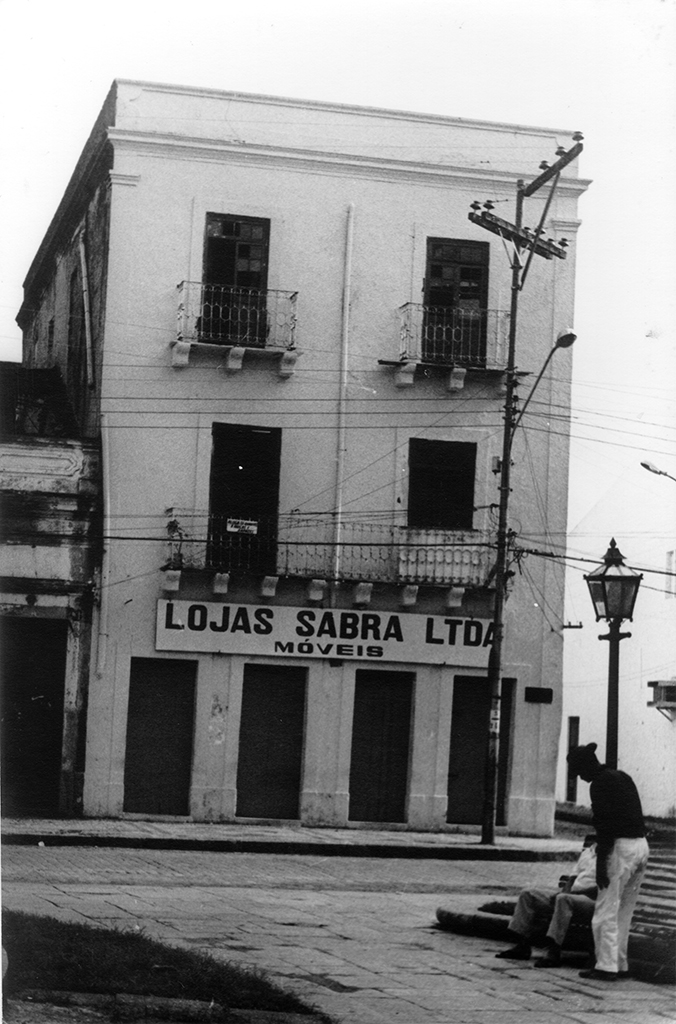Ferraz, Augusto. A Chronicle of a Patrimony that Needs To Be Preserved. IMS Clarice Lispector, 2022. Disponível em: https://site.claricelispector.ims.com.br/en/2022/12/08/a-chronicle-of-a-patrimony-that-needs-to-be-preserved/. Acesso em: 27 July 2024.
I died. I found out when, one day, on the sidewalk of Praça Maciel Pinheiro, I lifted my head, opened my eyes, and saw myself dead, there on the plaza’s sidewalk, the two-story house on the other side of the street. My broken heart inside my chest, the two-story house on Rua do Aragão, 387, where, on the second floor, Clarice Lispector lived a happy childhood here in Recife, despite the pains of the world and experiencing and feeling, mainly, the pains of an implacable disease that would one day take Mania, her mother, away from her. I found out when, laid out on the sidewalk there under the scorching Sunday sun, I turned my head to the right and saw a man beside me, who was also looking at the house. I do not know if he was dead or alive. He was wearing some ragged clothes. That fabulous creature kneeling beside me was looking at the house. He was looking at the house where Clarice had lived in her childhood, and without even imagining, he saw Clarice’s house, he saw the house that he had never had and where he would never be able to inhabit, he only looking at Clarice’s house and wanting it for himself, his eyes two tear drops on his face: in the house, he saw a chunk of bread. A chunk of bread, Clarice’s house at least exists, to satisfy the hunger of a hungry man. A chunk of bread, Clarice’s house at least exists, to satisfy the hunger of a hungry people. A shining people. Like a star. A chunk of bread, Clarice’s house at least exists, to mend my broken heart and make it beat again with joy inside my chest. I need my heart! Who does not need a heart? Even those without a heart need one to live! I want Clarice’s heart to come back to life, even if they have to remove the broken house at Praça Maciel Pinheiro from the graveyard where it lies in the open air. Is there no money in the world that can pay for this small resurrection, not even in the land where the great Pernambuco writer literally became Clarice Lispector? The current Champion of Pernambuco Literature? There is. I know that there is. All the money in the world is not enough to take a building dilapidated by human neglect and gather all the pieces, remove it from the ashes, and simply deliver it to the people of Recife, of Pernambuco, of Rio de Janeiro, of Alagoas, of Brazil, and of the world, return it in the form of bread to satisfy the hunger of everyone, be they rich or poor. No people is sufficiently rich or poor to disregard its own hunger. “Man does not live by bread alone,” that is Jesus’ teaching. Clarice actually followed the example of The Imitation of Christ, a medieval book attributed to Thomas A. Kempis, to make herself into Clarice and thus exist to the fullest. All hunger is permanent and needs to be satisfied at every moment. Drip-fed daily. And we do not need a war in Ukraine to explode in Recife, the currently broken Ukraine, where during a brief moment in her life the writer was born, and right in the center of Maciel Pinheiro, for us to know that this tragedy cannot take place! Clarice is alive, her childhood intact, and in 1976, precisely on the 19th and 20th of May, she went for a walk with Olga Borelli and me, on that same sidewalk at Praça Maciel Pinheiro, to revisit the two-story house on Rua do Aragão and, in silence, alone, within herself, as if it were a miracle, ascend the steep staircase of that house to, in the most complete solitude, reopen the door to her house and enter to, once inside, only leave with The Hour of the Star in hand to deliver it to her fellow human beings. At the end of September or October of 1976, here from Recife, I anxiously spoke to Clarice by telephone, as I used to do, and from her apartment in Leme, Rio de Janeiro, with her wonderful accent, she smilingly gave me the most awaited message that I could ever hear: Augusto, I’ve just written a novella! So your coming to Recife was very productive, wasn’t it? I replied, without being able to contain myself. And she said: Yeessss. Her characteristic accent had never been so pronounced and happy. My friend had spoken almost chokingly, joyfully, for ever since my constant visits to her apartment in Leme, I knew of her endeavor and participated in it. In the conversation that followed, Clarice revealed to me, with quick brushstrokes, after stating the work’s thirteen titles, a sketch of Macabéa and her hour, which she delivered to everyone in 1977, right before her own hour: to the men, women, children, youth, and elderly, to the hungry for bread and knowledge, to the hungry, without exception. And she humbly writes, at a given moment in her creation: “I did not invent this girl. She forced her being upon me.” Donation is one of the names by which Clarice answers. Ever since our first contact, by telephone, in a distant January of 1974. When a star inside Clarice had arisen mature to never again burn out. I had known about my friend’s humanity already from the sound of her voice. My God, how beautiful Clarice is! Clarice Lispector is a House! A Cultural Center, in the heart of Recife!







